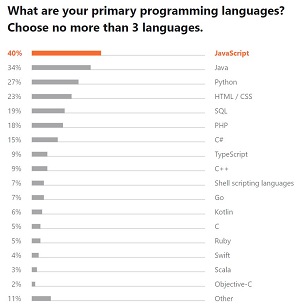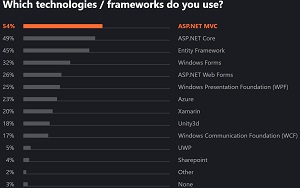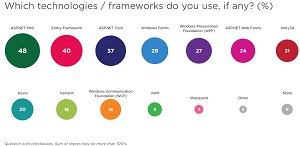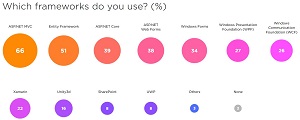News
Survey Says C# 'Most-Loved' Programming Language, .NET Core Slowly Gaining Traction
Developer tooling specialist JetBrains is reporting on its new survey that delves into many aspects of software development, including programming languages, wherein it dubbed C# the "most-loved" language according to one metric.
Early this year, JetBrains -- known for its "intelligent" tooling solutions including the Rider cross-platform .NET integrated development environment (IDE) -- polled nearly 7,000 developers in 17 countries to identify the "State of Developer Ecosystem."
Sections of the survey are devoted to major programming languages, including Java, C, C++, C#, Python and so on, with one "key takeaway" addressing their popularity, or love.
"The programming languages with the most love are Java and Python," the survey report said. "Second place is a tie between C# and JavaScript. But if the results are normalized by sample size, C# is the most loved language."
Here's how the languages stacked up when respondents were asked to report their primary usage:
 [Click on image for larger view.] Top Programming Languages (source: JetBrains).
[Click on image for larger view.] Top Programming Languages (source: JetBrains).
The company offered up this takeaway comparison of the leading languages:
- Java: The most popular primary programming language
- Go: The most promising programming language
- JavaScript: The most used overall programming language
- Python: The most studied language
Further investigating the C# camp, the survey indicates Microsoft's new open source, cross-platform "Core" direction is gaining traction but still has a long way to go as it usurps the ageing, Windows-only .NET Framework, with .NET Core and ASP.NET Core leading the migration (C# questions were only shown to developers who chose C# as one of their three primary programming languages).
"Adoption of .NET Core is growing, although C# remains a Windows-first language: more than 90 percent of developers use it only on Windows," the survey report said.
When asked what runtimes they regularly use, C# developers responded:
- .NET Framework -- 85 percent
- .NET Core -- 57 percent
- Mono -- 14 percent
That 57 percentage shown for .NET Core in 2019 compares to 42 percent reported in the company's 2018 survey and 37 percent reported in its 2017 survey, as shown by these graphics:
 [Click on image for larger view.] Regularly Used Runtimes in 2018 (source: JetBrains).
[Click on image for larger view.] Regularly Used Runtimes in 2018 (source: JetBrains).
 [Click on image for larger view.] Regularly Used Runtimes in 2017 (source: JetBrains).
[Click on image for larger view.] Regularly Used Runtimes in 2017 (source: JetBrains).
And, perhaps surprisingly, ASP.NET MVC still has an edge over ASP.NET Core, with the Windows-only offering actually experiencing an uptick in the number of respondents reporting using it this year as compared to last year:
 [Click on image for larger view.] Top Technologies/Frameworks Used by C# Developers (source: JetBrains).
[Click on image for larger view.] Top Technologies/Frameworks Used by C# Developers (source: JetBrains).
This year's report that shows 49 percent of C# respondents using ASP.NET Core compares to 37 percent in the 2018 survey, which, surprisingly, was a drop from 39 percent reported in 2017:
 [Click on image for larger view.] Regularly Used Frameworks in 2018 (source: JetBrains).
[Click on image for larger view.] Regularly Used Frameworks in 2018 (source: JetBrains).
 [Click on image for larger view.] Regularly Used Frameworks in 2017 (source: JetBrains).
[Click on image for larger view.] Regularly Used Frameworks in 2017 (source: JetBrains).
Other Microsoft-centric takeaways include:
- Almost two in every three C# developers have now moved to the latest version C#7, this is up from 44 percent in 2018, and 28 percent in 2017.
- This year VSTS is on par with TFS, with both having about a 25 percent share. Still, 57 percent of developers don't use either of them.
- Among respondents who either write or use unit tests, NUnit was reported by 40 percent of developers, followed by MSTest/Visual Studio Unit Testing Framework at 36 percent.
- When asked about usage of performance or diagnostic tools regularly in use, 48 percent of respondents replied the used Visual Studio's built-in performance and diagnostic tools, followed by dotTrace (18 percent), dotMemory (17 percent) and Windows Performance Toolkit (5 percent).
More generally, outside of the .NET world, JetBrains offered up this list of facts from the report:
- Cloud services are getting more popular. The share of local and private servers dropped 8 percent and 3 percent, respectively, compared to 2018.
- Machine learning professionals have less fear that AI will replace developers one day.
- The more people code at work, the more likely they are to code in their dreams.
- 44 percent of JavaScript developers use TypeScript regularly. In total, a quarter of all developers are using it in 2019, compared to 17 percent last year.
- The use of containerized environments by PHP developers is growing steadily by 12 percent per year.
- 73 percent of Rust devs use a Unix/Linux development environment, though Linux is not a primary environment for most of them.
- Go Modules appeared just recently, but already 40 percent of Go developers use it and 17 percent want to migrate to it.
- 71 percent of Kotlin developers use Kotlin for work, mainly for new projects (96 percent), but more than a third are also migrating their existing projects to it.
- The popularity of Vue.js is growing year on year: it gained 11 percentage points since last year and has almost doubled its share since 2017.
- The most frequently used toolset for developers involved in infrastructure development is Docker + Terraform + Ansible.
While more than 19,000 people participated in JetBrains' 2019 survey, this new report only includes data based on the survey answers received from external channels, which accounts for the nearly 7,000 number of respondents mentioned above. JetBrains said it will publish more complete results -- including raw data -- in the future.
Developers interested in comparing 2019's results with prior years can find the 2018 survey here and the 2017 survey here.
About the Author
David Ramel is an editor and writer at Converge 360.